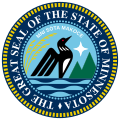| | |||||||||||||||||||||||||
| |||||||||||||||||||||||||
90 delegates to the Democratic National Convention (74 pledged, 16 unpledged) The number of pledged delegates received is determined by the popular vote | |||||||||||||||||||||||||
|---|---|---|---|---|---|---|---|---|---|---|---|---|---|---|---|---|---|---|---|---|---|---|---|---|---|
| |||||||||||||||||||||||||
| Elections in Minnesota |
|---|
 |
| Pledged national convention delegates | |
|---|---|
| Type | Del. |
| CD1 | 5 |
| CD2 | 5 |
| CD3 | 6 |
| CD4 | 7 |
| CD5 | 7 |
| CD6 | 6 |
| CD7 | 5 |
| CD8 | 7 |
| PLEO | 10 |
| At-large | 16 |
| Total pledged delegates | 74 |
The 2000 Minnesota Democratic presidential caucuses took place on March 11, 2000, as one of three contests scheduled on the weekend following Super Tuesday in the Democratic Party primaries for the 2000 presidential election, following the Colorado primary and the Utah primary the day before. The Minnesota caucus was an open caucus, with the state awarding 90 delegates towards the 2000 Democratic National Convention, of which 74 were pledged delegates allocated on the basis of the results of the caucus.
Contents
Vice president Al Gore won with 74% of the vote, gathering 72 delegates. Senator Bill Bradley placed second with 12% and 2 delegates. Lyndon LaRouche Jr., a conspiracy theorist who had ballot access in most states secured 11%, one of his best performances in any contest, but gained no delegates.


